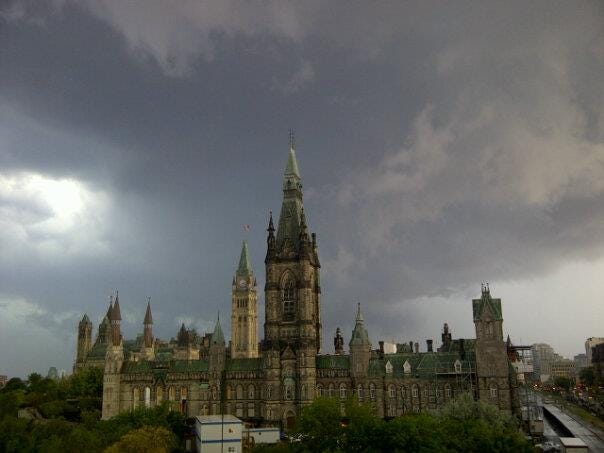An Election With Purpose
Welcome to Canada’s 45th general election since confederation. It is without a doubt among the most important so far. It is unusual to have a ballot question be so clear, the available answers so simple and well-defined, yet so much of the electorate still unsure. It is an existential, boolean choice. It is simply: Canada?
The United States made their choice a few months ago. Their answer to the fundamental, existential question of their country was “no,” and they’re very much getting what they voted for. Their economy has gone from strong growth to looming recession. Their democratic structures are dissolving. Their international trade relationships are collapsing. Their military alliances are crumbling. Even their judiciary is imploding, flailing uselessly in the wind as the rule of law evaporates before an emperor driven only by his ego and his wallet.
Canada now has the same choice. We have been told for years that Canada is “broken,” that the government is out to destroy us, steal from us, ruin our lives. That our taxes are too high. That the housing crisis and inflation are purely questions of partisan politics. That the costs of fighting climate change are more significant than the costs of dealing with the Anthropocene collapse toward which we are inexorably marching.
There are roughly 3.6 billion more people on earth today than the year I was born. The average worldwide standard of living has, in the same time, increased, unequally to be sure, but increased none the less. Our need for the natural resources, land, and energy that power the world’s societies has increased faster than the already mushrooming population. Sustainable growth is a myth; we will, sooner later, find all of the limits.
Our population, both within Canada and around the world as a whole, is growing faster than we can build homes. Our homes are selling to investors faster than they can be bought by people who need them. Our energy and resource costs are climbing.
Somewhere along the way, something has to give.
Home prices have skyrocketed. Investors — many of them smaller — have piled on seeing the growth potential and rental income. The increased demand has driven prices still higher. Those who may have been able to buy before must rent as they are driven out of the purchasing market, pushing rental demand up, causing home prices to rise still further, driving more people out of the housing market and into the rental market. The vicious circle is rapidly splitting our society into haves and have-nots when it comes to home ownership. While pronounced here, it is not unique to Canada, and in Canada is within the jurisdiction of the provinces.
The controversies surrounding the reaction to the pandemic that changed the world in the past few years laid bare the limits to our society’s empathy and understanding of the scientific method. Vast numbers of people believing simple but ridiculous explanations and falling for years of nonsense about the government not working in the interests of the people have given rise to anti-science and anti-vaccination propaganda that is directly endangering the lives of our people. Measles, of all things, is making a comeback in Canada, driven by people too deluded to vaccinate their children.
The problems are complex and global. Canada has fared relatively well; through difficult and expensive decisions, we largely survived the pandemic. Our death rate was significantly less than half that per capita of the United States. Our economic recovery has been stable. During the pandemic, the government brought in significant relief packages to keep individuals and businesses solvent through the shutdown of the economy. When the restrictions ended, the extra money in the economy from those measures caused rapid inflation, exacerbated by retail corporations trying to syphon off those funds, causing further artificial inflation.
It is clear that our social structures do not work for everyone. For such a significant portion of the population to believe that the country and its government is broken, that so many people are having trouble affording groceries and housing, that homelessness continues to exist, that healthcare wait times are not improving, are a reminder that there is much work to be done.
This election gives us a stark choice on the question of how we see our country.
Are we as Canadians up for the challenges we face? Can we imagine a country that is better than what we already have? That is willing and able to both recognise and build on our successes and find ways to solve the problems that still exist? Do we believe in Canada?
Or do we join the United States in saying that the problems are insurmountable? That, as in the US, it is time to burn everything to the ground, dismantle society as we know it, and try to start over somewhere in the religion-guided feudal era of Europe at the height of the Dark Ages?
So, what do you say, Canada?




I wish there was a third option presented federally. I don't see the binary you are seeing as a safe way to frame the election.
I'm not remotely a fan of the direction of the current Conservative party, very different than the Progressive Conservative party of my youth.
That said, I don't believe the "nothing is wrong, nothing to see here" that I'm seeing from the LPC and NDP is useful. They are not offering an option for people who recognize that the status-quo is not working, and also disagree with the "answer" that the populist-right have been pushing.
I don't see myself in the current NDP or LPC any more than I see myself in the current CPC.
I'm generally looking for a local candidate that is most likely to ignore the party and fake "leadership" and try to do something useful despite their party affiliation.